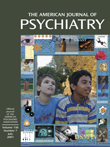Untreated Initial Psychosis
To the Editor: Beng-Choon Ho, M.R.C.Psych., et al. (1) concluded that the duration of initially untreated psychosis is not related to outcome early in the course of schizophrenia. This interpretation is at odds with most previous research (2) and even with their own data.
Dr. Ho and colleagues referred to data from the EPPIC program, an epidemiological sample of patients with first-episode psychosis (3), in which the duration of initially untreated psychosis was meticulously assessed (4, 5). Moderate correlations between the duration of initially untreated psychosis and key outcome variables (positive symptoms, negative symptoms, and psychosocial functioning) were evident at 1 year across the full group of patients with first-episode psychosis (N=352). The outcome variance explained by the duration of initially untreated psychosis ranged from 4% to 11%, and the duration of initially untreated psychosis was one of the strongest predictors, constituting 19%–38% of the total explained variance. Within the schizophrenia subgroup of patients with first-episode psychosis (N=149), the duration of untreated psychosis was significantly associated with psychosocial functioning at 6 months (r=–0.20, p=0.02) and 12 months (r=–0.23, p=0.008). The PEP program in London, Ont., Canada, has also found associations of similar magnitude.
Dr. Ho et al. found in their study that these moderate correlations were not significant; however, their capacity to detect effects of this magnitude was weakened by their modest group size (N=74), resulting in low statistical power, and further weakened by their decision to apply Bonferroni corrections.
A second attenuating factor was their decision to exclude patients with schizophreniform disorder. When the study group was expanded to include these, more robust relationships emerged, e.g., between the duration of untreated psychosis and psychosocial outcome at 6 months (r=–0.29, p<0.0001). The criterion of 6 months for schizophrenia censored the study group, which created a floor effect. It was inappropriate to retain this criterion in a study of this nature. The outcome for this subgroup was more uniformly poor, as reflected in the relatively poor recovery rates reported by Dr. Ho et al. Reduction of outcome variance attenuates or conceals the relationship with the duration of untreated psychosis (6). This jars with the authors’ assertion that the findings “bode well for patients.”
Reducing treatment delay is only one pillar of the early intervention paradigm; however, it is important practically and symbolically, as treatment delay is one of the few potential malleable risk factors for poor outcome. We agree there is minimal evidence that prolonged duration of untreated psychosis is biologically toxic, but it is clearly psychosocially toxic.
Even small improvements in outcome could greatly reduce morbidity if applied to large numbers of people. We are concerned that, notwithstanding the endorsement of early intervention by Dr. Ho et al. (1), their uncritical interpretation of their data and the literature may undermine the still fragile efforts to implement early detection and timely treatment of psychotic disorders in the real world.
1. Ho B-C, Andreasen NC, Flaum M, Nopoulos P, Miller D: Untreated initial psychosis: its relation to quality of life and symptom remission in first-episode schizophrenia. Am J Psychiatry 2000; 157:808-815Link, Google Scholar
2. McGorry PD, Krstev H, Harrigan S: Early detection and treatment delay: implications for outcome in early psychosis. Current Opinion in Psychiatry 2000; 13:37-43Crossref, Google Scholar
3. McGorry PD, Edwards J, Mihalopoulos C, Harrigan SM, Jackson HJ: EPPIC: an evolving system of early detection and optimal management. Schizophr Bull 1996; 22:305-326Crossref, Medline, Google Scholar
4. McGorry PD, Copolov DL, Singh BS: The Royal Park Multidiagnostic Instrument for Psychosis: part 1: rationale and review. Schizophr Bull 1990; 16:501-515Crossref, Medline, Google Scholar
5. McGorry PD, Singh BS, Copolov DL, Kaplan I, Dossetor CR, Van Riel RJ: The Royal Park Multidiagnostic Instrument for Psychosis: part 2: development, reliability and validity. Schizophr Bull 1990; 16:517-536Crossref, Medline, Google Scholar
6. Carbone S, Harrigan S, McGorry P, Curry C, Elkins K: Duration of untreated psychosis and 12-month outcome in first-episode psychosis: the impact of treatment approach. Acta Psychiatr Scand 1999; 100:96-104Crossref, Medline, Google Scholar



